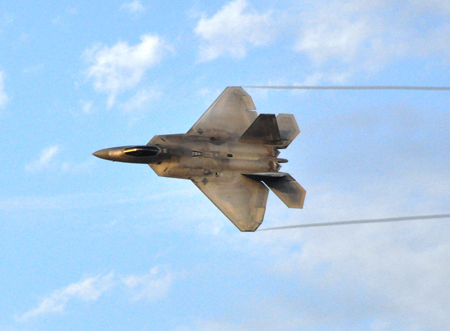Air  Combat Command officials said they are continuing to take action to slow, and, within the near term, dramatically restrict Fiscal 2013 spending as the command braces for budget sequestration—set to kick in on March 1—and a projected $1.8 billion dollar shortfall in overseas contingency funding in the fiscal year. “We are prioritizing our efforts to sustain force structure and preserve combat capability,” said ACC boss Gen. Mike Hostage in the command’s Feb.15 release. If the sequester hits, ACC might have to reduce flying operations for two-thirds of its squadrons by mid to late May, states the release. “Remaining as mission-ready as possible is our imperative, and priority for flying hours will go to units that are deployed or preparing to deploy and to formal training units that provide fully qualified aircrews,” said Hostage. The Nevada Test and Training Range and Utah TTR would potentially have to close in early summer, states the release. Air Force Materiel Command announced that sequestration would force it to take steps like reducing weapon systems sustainment and testing. (Includes Langley report by TSgt. Randy Redman) (See also Space Not Immune from Terrestrial Challenges.)
Combat Command officials said they are continuing to take action to slow, and, within the near term, dramatically restrict Fiscal 2013 spending as the command braces for budget sequestration—set to kick in on March 1—and a projected $1.8 billion dollar shortfall in overseas contingency funding in the fiscal year. “We are prioritizing our efforts to sustain force structure and preserve combat capability,” said ACC boss Gen. Mike Hostage in the command’s Feb.15 release. If the sequester hits, ACC might have to reduce flying operations for two-thirds of its squadrons by mid to late May, states the release. “Remaining as mission-ready as possible is our imperative, and priority for flying hours will go to units that are deployed or preparing to deploy and to formal training units that provide fully qualified aircrews,” said Hostage. The Nevada Test and Training Range and Utah TTR would potentially have to close in early summer, states the release. Air Force Materiel Command announced that sequestration would force it to take steps like reducing weapon systems sustainment and testing. (Includes Langley report by TSgt. Randy Redman) (See also Space Not Immune from Terrestrial Challenges.)
The U.S. continued to position significant military assets closer to the Middle East as the Trump administration weighs whether to strike Iran.

